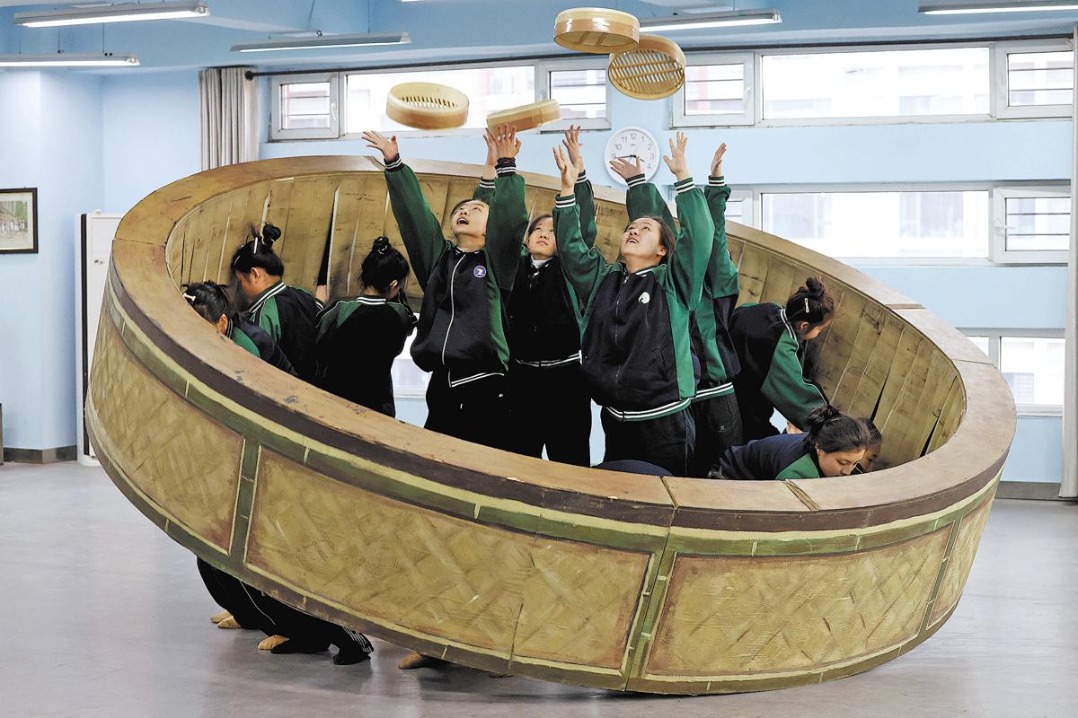FESTIVAL RETURNS YI CULTURE TO ITS ORIGINS
With an authentic play, folk songs and farm dances, ethnic group teaches global audiences of deep traditions, reports Cheng Yuezhu.

Every year since 2019, Xichang, Sichuan province, has hosted the Daliangshan Theater Festival, treating theatergoers to a series of international performances in addition to the city's natural landscape that includes Qionghai Lake and surrounding mountains.
While it might not have a long history with contemporary theater, the city does not lack cultural richness brought by the Yi ethnic group, being capital of the Liangshan Yi autonomous prefecture.
The festival has paid homage to Yi rituals and traditions since its inception. In 2019, for the first edition of the festival, ticket sales began on the day of the traditional Torch Festival. And the festival officially opened on New Year's Day in the Yi calendar.
For this year's sixth edition, the festival again honors the Yi ethnic culture with the original play Star Returning, which opened the festival on Nov 8 and interprets ethnic traditions through an international lens.
Star Returning is a collaborative piece by artists from home and abroad, coproduced by the International Theatre Institute ITI, China Theatre Association, Shanghai Theatre Academy and Liangshan Cultural Tourism Group.
At last year's festival, Tobias Biancone, director general of ITI, revealed that for this year's opening show, he will invite an international theater artist to create a production rooted in Chinese ethnic culture with a contemporary vision.
Directed by Samoan theater director and choreographer Lemi Ponifasio, the production features entirely local artists who embody Yi ethnic cultural elements. Through folk songs, ceremonies, farm dances and Torch Festival traditions, the production represents the worldview and reverence for the nature of the ethnic group.
"The project is not so much about making theater or art. It's about returning to origins, returning to family, returning to community, and returning to oneself," says Ponifasio.
"I think we're always lost when we're far away from home. To approach life, I think it's best from one's cosmic vision or worldview created by nature and our ancestors."
To ensure an authentic representation of ethnic culture, Ponifasio invited the performers to participate in the creative process, such as going back to their home villages to collect and learn folk songs.
Many performers brought songs that have been passed down from generation to generation and learned to sing in various dialects and styles, yet all featuring an unadorned raw power.
With a minimalistic monochrome setting, the performers sing folk songs in their dialects without any accompaniment and perform dances derived and choreographed from traditional ritual movements.
Performer Wu Zimo says that in rehearsing and performing the dances, she feels she is returning to her true nature.
"The director and producer guided us in finding inner peace, encouraging us to examine and rediscover ourselves under the dim lights, undisturbed by external distractions," Wu says.
To her, through dance moves distilled from ancient farming and ritual practices, the production is relative to the Yi group's philosophy on life and death.
"While we're often taught how to live, we are seldom taught how to face death. In Yi culture, both life and death hold significance. We try to live with splendor and when someone passes, we hold grand funeral ceremonies because we see death as the start of a new life," Wu adds.
Apart from its three performances from Nov 8 to 10, Star Returning was performed at the 25th Carthage Theater Days in Tunis, Tunisia, from Nov 23 to 30. According to the Daliangshan festival committee, the production will attend European theater festivals and go on a European tour from May 2025.
Until Nov 19, the Sixth Daliangshan Theater Festival staged around 100 theater productions from 11 countries, featuring traditional performing arts exchanges and theater master classes.
An exchange event on Nov 10 showcased traditional performing arts from China and members of the League of Arab States including Algeria, Morocco, Jordan, Iraq and Sudan. Chinese artists demonstrated traditional opera forms such as Kunqu, Peking and Yuju operas.
On Nov 11, a panel discussion themed on "theater connecting the world" gathered theater artists from over 20 countries joined by the festival's co-initiators, including veteran actor Pu Cunxin, playwright Li Ting, poet Jidi Majia, Tobias Biancone and veteran director Wang Xiaoying.
"From the festival's initial planning stages, we had two main directions. First, it would be firmly rooted in the region's rich ethnic culture, drawing strength from its deep cultural heritage and people. The other would maintain an outward-looking approach, being open and inclusive," Wang says.
The festival has connected with international theaters and expanded its global presence while remaining true to its roots in ethnic culture, hosting panel discussions, creating an opening show featuring international collaboration and introducing an increasing number of foreign theater productions.
In the past six years, Wang says he has observed Xichang's urban development become closely associated with the festival, including new cultural venues and facilities that attract theatergoers and tourists alike.
Deputy researcher from Shanghai Art Research Center and theater enthusiast Yang Zi says that in her opinion, the festival stands out with the diversity of its performance spaces. While the main venues lie within central Xichang, the stages take the city's natural landscape as backdrops, such as Qionghai Lake and Lushan Mountain.
"It wasn't until I arrived in Xichang that I realized what a beautiful place it is. The Daliangshan Theater Festival is youthful, brimming with vitality and appeal, providing a stage for young people to showcase their talents," Yang says.
To her, the festival is a celebration for the general audience. Apart from theater productions, the festival also features performances at public venues so passersby can experience the festival's charm.
The festival has also expanded its influence to other parts of China, including Yunnan and Guizhou provinces, allowing theater enthusiasts from nearby areas to attend international-level productions without traveling far, she says.





Today's Top News
- China looks to strengthen LAC relations with release of policy paper
- Group of Friends of Global Governance established
- China's CPI up 0.7% in November
- Governance of China an inspiring path
- Sharper focus on expanding demand seen
- FM: Facts prove Tokyo wrong on Taiwan






























